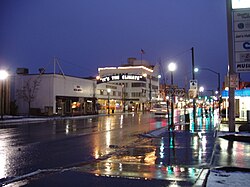Grant's Pass, Oregon
| Grants Pass, Oregon | |
|---|---|
| City | |
| City of Grants Pass, Oregon | |
 |
|
| Motto: Live Rogue; It's the Climate! | |
 Location in Oregon |
|
| Location in USA | |
| Coordinates: 42°26′20″N 123°19′42″W / 42.43889°N 123.32833°WCoordinates: 42°26′20″N 123°19′42″W / 42.43889°N 123.32833°W | |
| Country | United States |
| State | Oregon |
| County | Josephine |
| Incorporated | 1887 |
| Government | |
| • Mayor | Darin Fowler |
| Area | |
| • Total | 11.03 sq mi (28.57 km2) |
| • Land | 10.87 sq mi (28.15 km2) |
| • Water | 0.16 sq mi (0.41 km2) |
| Elevation | 960 ft (290 m) |
| Population (2010) | |
| • Total | 34,533 |
| • Estimate (2013) | 35,076 |
| • Density | 3,176.9/sq mi (1,226.6/km2) |
| Time zone | Pacific (UTC-8) |
| • Summer (DST) | Pacific (UTC-7) |
| ZIP codes | 97526, 97527, 97528, 97543 |
| Area codes | 541 and 458 |
| FIPS code | 41-30550 |
| GNIS feature ID | 1142947 |
| Website | City of Grants Pass |
Grants Pass is a city in, and the county seat of, Josephine County, Oregon, United States. The city is located on Interstate 5, northwest of Medford. Attractions include the Rogue River, famous for its rafting, and the nearby Oregon Caves National Monument located 30 miles (48 km) south of the city. Grants Pass is 256 miles (412 km) south of Portland, the largest city in Oregon. The population was 34,533 at the 2010 census.
Early Hudson's Bay Company hunters and trappers, following the Siskiyou Trail, passed through the site beginning in the 1820s. In the late 1840s, settlers (mostly American) following the Applegate Trail began traveling through the area on their way to the Willamette Valley. The city states that the name was selected to honor General Ulysses S. Grant's success at Vicksburg. Grants Pass post office was established on March 22, 1865. The city of Grants Pass was incorporated in 1887.
The Oregon–Utah Sugar Company, financed by Charles W. Nibley, was created, leading to a sugar beet factory being built in Grants Pass in 1916. Before the factory opened, Oregon-Utah Sugar was merged into the Utah-Idaho Sugar Company. Due to labor shortages and low acreage planted in sugar beets, the processing machinery was moved to Toppenish, Washington in 1918 or 1919.
...
Wikipedia

